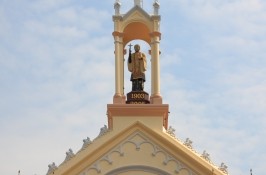{Fiction} Confession is Good for the Soul
Fiction, Literature (Image courtesy of Freedigitalphotos.net / Keerati)
(Image courtesy of Freedigitalphotos.net / Keerati)
The last time I went into a church, it was to confess. Father Albert asked me my sins, and I told him that I lusted for my neighbor’s wife; how I coveted her, imagining her eyes gleaming when she sees me, her bosom heaving and beckoning me from underneath her low-cut top.
After cleansing my conscious, I asked the father of his sins, my curiosity getting the best of me. No, that’s not it. I didn’t feel comfortable exposing the deepest, darkest parts of my inner-self without the recipient reciprocating.
Father Albert was a good sport and he indulged my inquisitiveness. Father Albert admitted the sin he struggled with most was the sin of pride. He heard all the sins of the townspeople, the demons lurking in their souls, but they knew nothing of his transgressions and faults. He said he judged his flock, for their sins were not his—their deeds more vile and disturbing than the thoughts he never acted upon. Every Sunday he stood at the podium and gazed down upon his flock, his heart filled with contempt towards those poor, wretched souls. In his eyes, each and every one of his congregation was going straight to Hell—that is, if it was his decision. The things he heard, the thoughts and deeds confided to him, were perverse and boarded on the edge of legality.
He grunted and then chuckled after this last part, as if to dismiss it as some sort of sick joke. He said it was odd speaking so freely and candidly with me. Although he confessed to his fellow priests and bishop, his admissions to them were frivolous or mundane—he had spoken curtly with an unexpected visitor, failed to help someone recover goods spilled from a dropped bag (something that he claimed “nagged at my conscious”). These were never his most damning sins. Why would he expose himself to his peers and potential rivals? They could use this information against him to thwart his advancement. Truly confessing to his superior could hinder his chances at promotion.
Father Albert concluded that with me, a mere parishioner, he could be honest. What could I do with his true thoughts? Nothing. People will always believe clergy over layman.
He was right. Although I knew he judged his flock—wrongly or justly, only God can say—I could do nothing against. My two options were to continue going to church and biting my tongue when he preached about forgiveness and non-judgment or leave his flock.
That was the last time I ever stepped into a church.






















